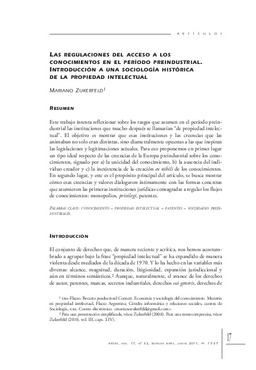Las regulaciones del acceso a los conocimientos en el período preindustrial. Introducción a una sociología histórica de la propiedad intelectual
The regulations of the access to knowledge in the preindustrial period. Introduction to a sociological history of the intellectual property
Abstract
Este trabajo intenta reflexionar sobre los rasgos que asumen en el período preindustrial las instituciones que mucho después se llamarían “de propiedad intelectual”. El objetivo es mostrar que esas instituciones y las creencias que las animaban no solo eran distintas, sino diametralmente opuestas a las que inspiran las legislaciones y legitimaciones actuales. Para eso proponemos en primer lugar un tipo ideal respecto de las creencias de la Europa preindustrial sobre los conocimientos, signado por a) la unicidad del conocimiento, b) la ausencia del individuo creador y c) la inexistencia de la creación ex nihili de los conocimientos. En segundo lugar, y este es el propósito principal del artículo, se busca mostrar cómo esas creencias y valores dialogaron íntimamente con las formas concretas que asumieron las primeras instituciones jurídicas consagradas a regular los flujos de conocimientos: monopolios, privilegi, patentes. The aim of this paper is to discuss the characteristics of the institutions that, many years later, were named “intellectual property”. The objective is to show the direct opposition between those institutions –and the beliefs that support them– and the actual intellectual property system, with its legislations and legitimizations. First, we put forward an “ideal type” about the shared beliefs in the preindustrial Europe about knowledge, made of three ideas: a) The indivisibility of knowledge, b) The absence of the notion of individual creator, c) The rejection of the concept of novelty. Second, and this is the main purpose of this paper, we try to show the intimate link between that ideal type and the legal institutions that regulated de flows of knowledge in the modern preindustrial era: monopolies, privilege, patents.

